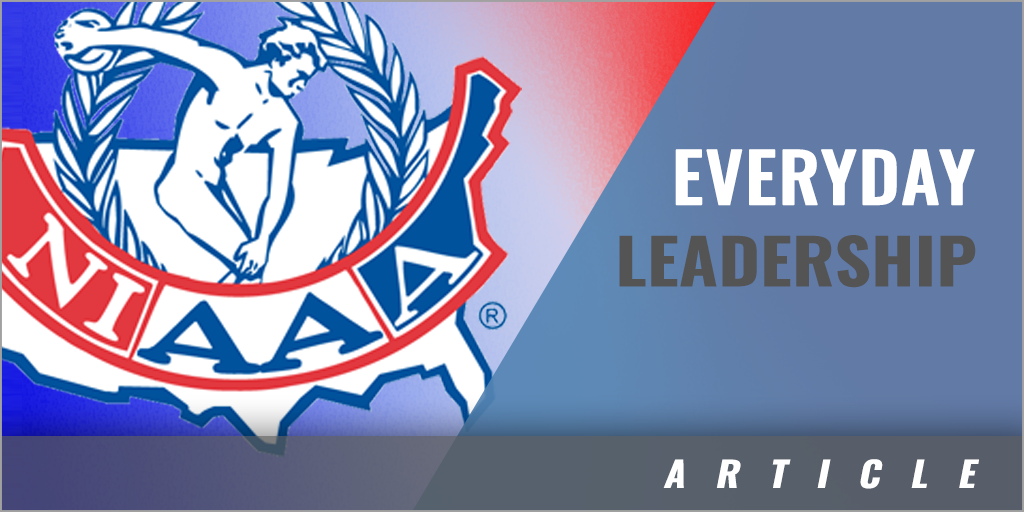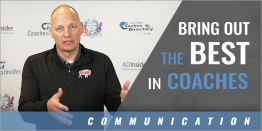|
By: Kris Knowles, CAA When it comes to leadership, particularly in the athletic world, no two people accomplish it in the same way. If I've learned anything in the last 14 years as an athletic administrator, it's to take great ideas or principles and adapt them to my setting, situation or decision at hand. Just like exceptional coaches in the NFL or college basketball, high school administrators pay attention to others in our industry, gleaning knowledge that may work in our place of business. Sometimes pearls of wisdom come from celebrity coaches, but most often they come from those around us. Over the years, I have kept a notebook titled Leadership Lessons, which has been helpful in growing, managing, and leading athletic departments. Some of these lessons are simply words or phrases stolen from successful coaches and others are more complex philosophical leadership considerations from classes I have taken or friends in the business. I refer to this notebook often, as many of these lessons can be applied to daily challenges and help frame pending decisions. The following 5 leadership lessons can be applied to a variety of athletic administrative situations. My hope is these thoughts may help new as well as experienced athletic administrators think about things differently and provide another perspective to consider. "Solve it, don't win it." A former superintendent early in my coaching career told me this and it has helped on several occasions as an AD. When entering a difficult conversation, particularly for competitive people like us, it's easy to take things personally, become defensive, and try to win the situation. This may lead to a power struggle or escalation, and move us further away from a positive resolution. It's hard to stay in control when your emotions take over the steering wheel. Looking for common ground, putting our ego aside and working toward a solution can serve the administrator well. Compromise is a powerful tool in an administrator's tool kit. Solving the situation may not give us everything we want, but it will provide an avenue for all parties to move forward. "Great leaders meet people where they are." This means the leader understands what tools an employee needs to excel in his or her work environment and is willing to help them grow. If you have ever been around exceptional leadership – I mean the kind of leadership that transcends professions – a common trait of these leaders is they are acutely aware of the strengths and weaknesses in their people. I think of former Duke Men's Basketball Coach Mike Krzyzewski when I think of this kind of leader. These leaders don't just identify the weakness of a person – that's the easy part – but they are willing to invest in an employee, create a path for growth, and support the effort. Athletic directors don't always have the luxury of hiring personnel who have years of experience and are prepared to handle the difficulties of the job immediately. It's our job to "meet them where they are," emphasize strengths we see in them, while helping them grow in areas of weaknesses. Experienced coaches may also need this same approach. As the sports landscape changes, veteran coaches may need support in areas that are evolving in their sport. We need to recognize this and meet them where needed. "Your culture is what you allow." This is something I have been working on a lot lately. Taking time to evaluate, identify and address strategic items inside our programs we need to stop allowing, should start allowing, or continue to allow is critical. To me, this is the process of addressing who we are as a school and what we want to be known for. Success is what you address; lack of success can be attributed to what you are unwilling to address. A great example of this comes from Brad Stevens, President of Basketball Operations for the Boston Celtics. Stevens states, "We're building a culture of accountability, trust and togetherness. Entitlement won't be tolerated." Your culture will also be defined by how you handle adversities and the team's response. I have always liked the idea of "don't react, respond." Consistent, measured responses will develop a balanced and functional culture over time. This is easier when you have taken time to evaluate what you will and won't tolerate in your school and programs. "There will come a time when your decisions are questioned. Making decisions that are best for the 'we' should be considered. Sometimes that 'we' will be your family." Our business is tough. For all the great moments, triumphs and celebrations we get to be part of working with students and staff, we will face difficult decisions and be challenged. There will be a time when someone questions you, your loyalty, and your integrity. When working through these situations, understanding the 'we' has always helped me. The 'we' is about understanding who is on your team, recognizing how decisions may affect these people, and calculating how best to help those closest to you. Your 'we' may be your athletics staff, your office staff, your custodial or facilities staff. Giving thought to how a decision affects members of the team is important and will help in the process. At some point, decisions will need to be made regarding your career. Do you pursue a different AD position? Do you have the opportunity to change your administrative role inside your school? When considering career changes, make sure the 'we' is your family. "It's a people business." Relationships matter. In fact, I would argue quality relationships are the most important part of being an athletic director, teacher, or coach. When making staff decisions, try to keep in mind you are working with a person who has a family, is a parent, has a spouse, has interests outside of sports, and probably just wants what's best for the people they care about. It's important to keep an employee's integrity intact if at all possible. This does not mean we don't make hard choices, but remembering that our business is about people can help you process and come up with the best possible decision. Coaches need to keep this idea in mind as well when working with student-athletes. It's important for us to remember that people come to work, and our athletes come to practice each day dealing with life's challenges. Some days we will get a person's best, and some days we may not. I believe most people want to do the best they can and are inherently good. It's important to not make assumptions and give our people the most respectful interpretation we can. It's also important to be cautious of those who are motivated by self-interest, greed, and self-promotion. Building a team with these people is difficult. I hope these ideas spark some interest and conversation. There are nuggets of wisdom all around us that can help make our jobs just a little easier and more enjoyable. We can learn so much from our colleagues, associates, and experiences if we take the time to listen. Pete Carroll, Las Vegas Raiders Head Coach, likes to say, "Find the good." This might be my favorite leadership lesson of all time. Take the time to find the good in your place. It's all around you!
|







